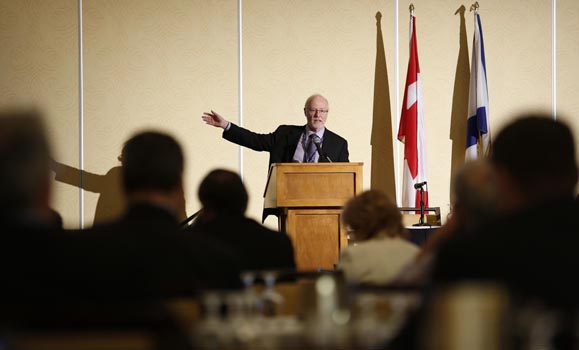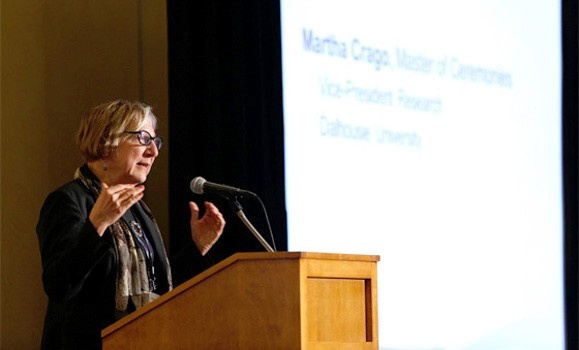At times, it flirts with being an overused buzzphrase. But to attendees at Nova Scotia’s first Innovation Summit, the “I” word is critical to the province’s future.
“Nova Scotians have many innovative ideas,” said Premier Darrell Dexter, introducing the summit last Tuesday. “Business, industry and all levels of government need to work together to support that innovative spirit.”
The summit brought together public and private stakeholders from industry, business and academia to develop strategies around a more systemic approach to innovation.
Dal Vice-President Research Martha Crago, who hosted the two-day event, defined innovation as “creating value from new ideas.” But ideas alone aren’t enough, explained Dr. Crago in her introductory remarks: it takes an ecosystem to create that value, “the interaction between key elements and ingredients that brings new ideas to market — as new products, processes or services.”
As you might well expect, universities are one of those key ingredients.
“One advantage you have here [in Nova Scotia] is a world-class university,” said keynote speaker Tom Jenkins, executive chairman and chief strategy officer of OpenText, later encouraging attendees to “organize around Dal” when it comes to innovation.
At several point in his address, Jenkins, a tech pioneer who chaired the Government of Canada’s Research and Development Policy Review Panel, discussed how links with university research and a collaborative “barnbuilding” atmosphere were key factors in the rise of an innovative tech culture in Waterloo, Ontario.
“It takes a community to raise an innovative company,” says Jenkins. He also said that research into big data — oceanographic data in particular — represents a huge opportunity for Nova Scotia. “You should be world leaders on this.”
Building a bridge between knowledge and need
The spark behind the Innovation Summit was last year’s trade mission to Israel, which Dalhousie took part in. “What we saw created excitement and led to numerous conversations,” said Dr. Crago. “When we came home, some of us thought we should share what we learned and expand the conversation to people here and around the world.”
It’s not easy, though, to be more competitive and innovative in a global economy. “This is hard,” as Jenkins bluntly put it.
One of those challenges is figuring out how best to leverage ideas and expertise from universities. Eric Grimson, chancellor of the Massachusetts Institute of Technology, offered insight into how his university has become renowned for doing just that, detailing a number of cross-disciplinary programs that, as he puts it, “embeds innovation in our DNA.”
“There’s no single piece to that ecosystem, no one place where you go if you want to be involved in innovation and entrepreneurship…. No one unit owns entrepreneurship. No one unit owns innovation.”
He stressed that in an age when grads are looking to start businesses earlier in their careers, universities need to development curricular structures that encourage interaction, collaboration and cooperation across units. “That [one great] idea may come from a collaboration between a biologist and a computer scientist, and if they’re sitting in separate units with big barriers between them, we don’t think that’s going to help.”

That interdisciplinary spirit was evident throughout day two of the conference, where Dal was well represented on the session’s breakout panels. The agriculture panel featured two representatives from Dal’s Faculty of Agriculture: Sean Myles (Canada Research Chair in Agricultural Genetic Diversity) and Richard Donald (associate dean, external strategic partnership and interim associate dean, Research). And on the oceans panel, Marlon Lewis (chair, Department of Oceanography) and Doug Wallace (Canada Excellence Research Chair in Ocean Science and Technology) engaged in a discussion moderated by Jim Hanlon, CEO of the Halifax Marine Research Institute.
King’s President George Cooper and Dal President Tom Traves were also part of the proceedings, speaking to delegates on Wednesday afternoon about translating the event’s discussions into action, and working to answer the questions that Dr. Crago kicked off the event with.
“How can we best generate good ideas that meet a need?” she asked. “And how can we get those good ideas to create more value in the market whether it is through goods and service innovation, process innovation, organizational innovation and market innovation?”
The innovation discussion will continue this May at the third installment of the 4Front Atlantic Conference in May, which brings toegether business and academic thought leaders to discuss Atlantic Canada's opportunities in a changing global economy.

